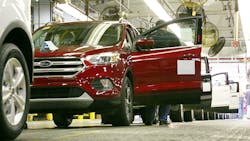SUVs Enjoy Summer Surge as Car Workers Take Unwanted Vacation
Workers at U.S. auto factories are finding that their summer schedules may be determined by the height of the model they assemble.
General Motors Co., Ford Motor Co. and Fiat Chrysler Automobiles NV are all shortening summer shutdowns or forgoing them altogether at some plants that make popular SUVs and pickups as demand for the bigger vehicles continues to chug along. At the same time, several U.S. car plants are bracing for a cut in summertime shifts and output as manufactures try to align supply with still-slumping passenger-car demand.
The divergence reflects the profound -- and perhaps permanent -- shift in consumer preferences for bigger, higher-riding models that get almost car-like fuel economy while also carrying more stuff. The change has been painful for makers of sedans and coupes as car models have lost 4 points of U.S. market share in the first five months of the year, according to Autodata Corp. When June results are reported Monday, analysts project a sixth straight month of declining vehicle volumes, primarily driven by falling car demand.
Passenger Car Data Doesn't Lie
“You can’t hide from the data,” said Tim Kuniskis, head of passenger-car brands for FCA US. “Since 2008, passenger-car share has dropped 25%. So you look at that and you say ‘That’s kind of a disastrous sign of what the future is; what are you going to do?’”
One answer is to cut back at plants making less popular cars. GM, for example, is taking extra time off this summer at its Chevrolet Cruze plant in Lordstown, Ohio, that already went from three shifts to two. Its Fairfax, Kansas, factory that makes the midsize Malibu will also end its third shift later this summer or early in the fall. But GM’s pickup plants in Michigan and Missouri are running non-stop, union officials said.
“Passenger cars continues to be very, very challenging,” GM Chief Financial Officer Chuck Stevens told analysts on a conference call this week. “Hence us taking production out because we’re just not going to chase passenger cars at any cost from a profit perspective.”
Other SUV plants are also running near full tilt. Ford is cutting its traditional two-week shutdown in half at the Louisville, Ky., plant that makes the Escape and Lincoln MKC crossovers. Fiat Chrysler -- which last year ended production of its Dodge Dart compact car and Chrysler 200 midsize sedan to make room for bigger vehicles -- is adding a week of output at four plants that make Ram pickups or Jeeps.
If any cars make Fiat Chrysler excited, it’s ones that are very distinct from volume leaders like the Toyota Camry and Honda Accord. Kuniskis revealed an 840-horsepower Challenger SRT Demon at this spring’s New York auto show and the company is shortening the summer break at its small Detroit plant that makes Viper sports cars, which are in their last year of production.
“It’s obvious the switch is going on,” FCA’s Kuniskis said in an interview at Chelsea Proving Grounds in Michigan this week. “Mainstream, commoditized, price-point, A-to-B cars are down dramatically, because the UVs have more utility and functionality for the customer.”
Rental Reality
The same is true for drivers at the rental-car counter. Companies like Hertz Global Holdings Inc. already have too many family sedans and compacts in their fleets, so they aren’t buying new ones like they once did. Avis Budget Group Inc. is also trying to get its fleet sized for demand and sold a record number of cars in the first quarter, the company said last month.
In June, GM probably cut its sales to fleet customers by about 20% while Ford may have reduced them by about 15%, according to estimates from Ryan Brinkman, an analyst with JPMorgan Chase & Co. The expectation of falling fleet sales is the main reason he projects both automakers will report declining sales this month.
“Softness in rental is definitely going to disproportionately hit sedans,” said Maryann Keller, an independent auto industry consultant in Stamford, Connecticut.
June Estimates Favor Toyota, Honda
Among the biggest automakers, only Toyota Motor Corp. and Honda Motor Co. are seen reporting increases in June deliveries, according to the averages of analysts’ estimates. Volkswagen AG, the world’s biggest automaker but still a smaller player in the U.S., may have seen its combined VW and Audi brand sales rise with the addition of the VW Atlas SUV that is made in Chattanooga, Tenn.
It could be that sedan sales are tepid in part because the top-selling models were all redesigned soon after the recession and have gotten a little stale. The second half of the year is bringing new looks for the Camry, Accord and Nissan Altima, which could give these models a boost.
“If those three products cannot revive the car segment at least a little bit,” said Rebecca Lindland, an analyst with Kelley Blue Book, “I think that it could go the way of the minivan.”
By Jamie Butters
About the Author
Bloomberg
Licensed content from Bloomberg, copyright 2016.
